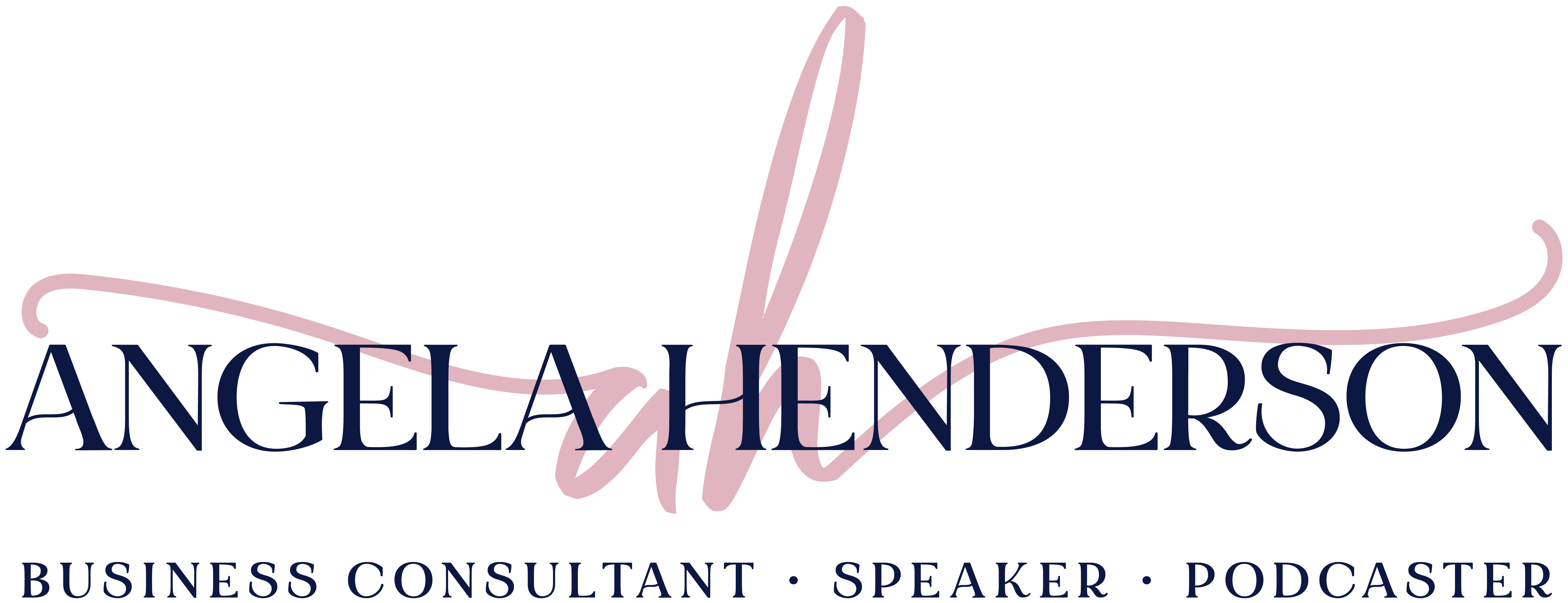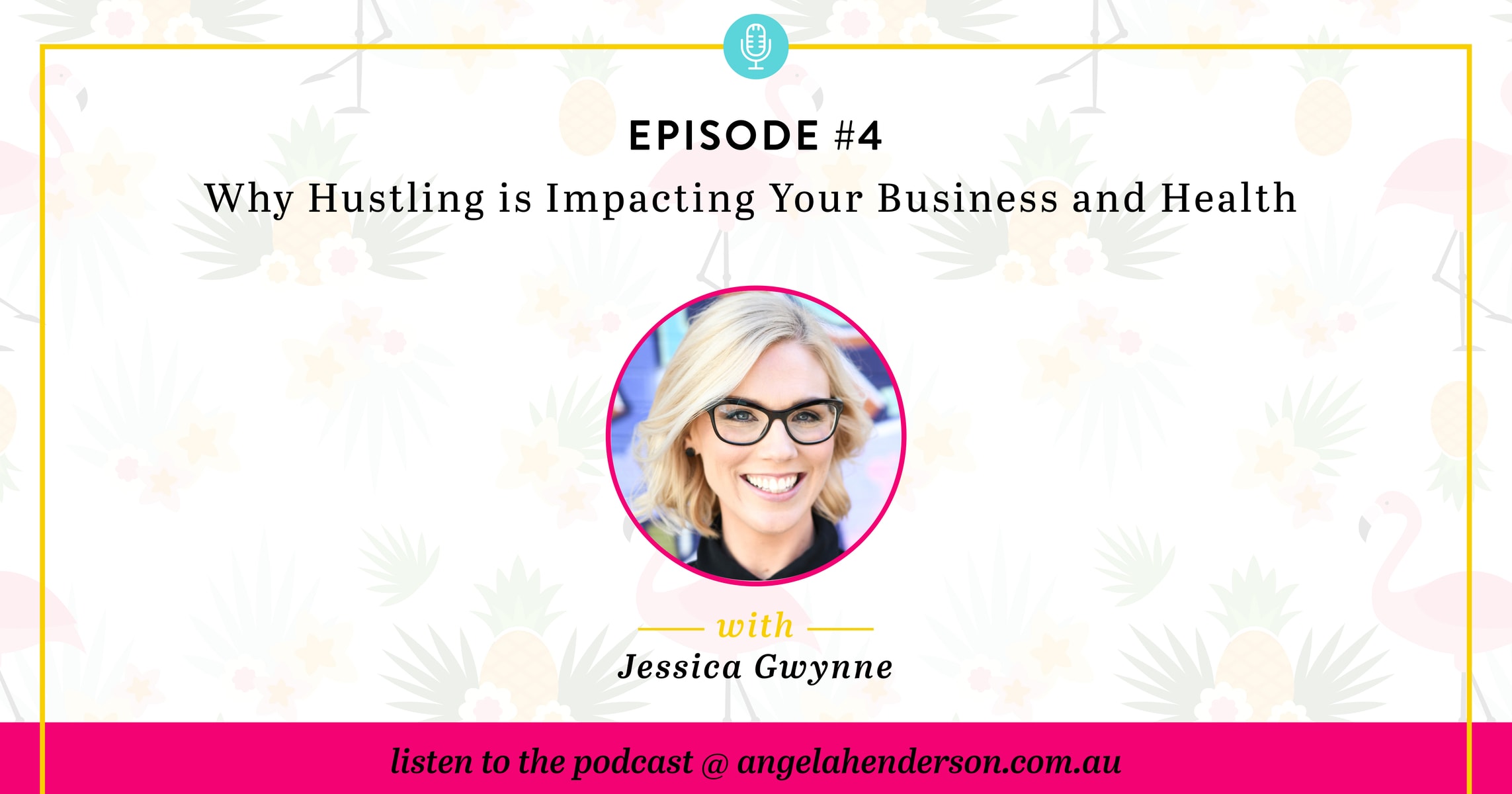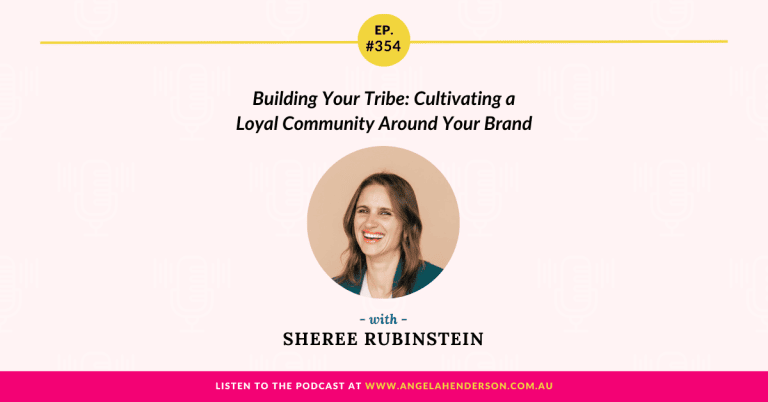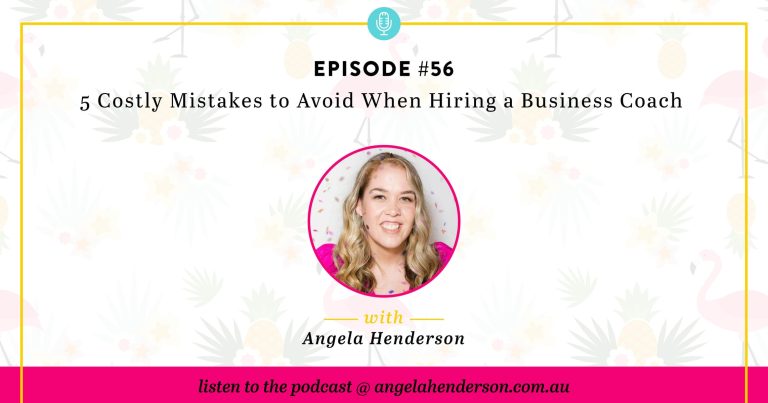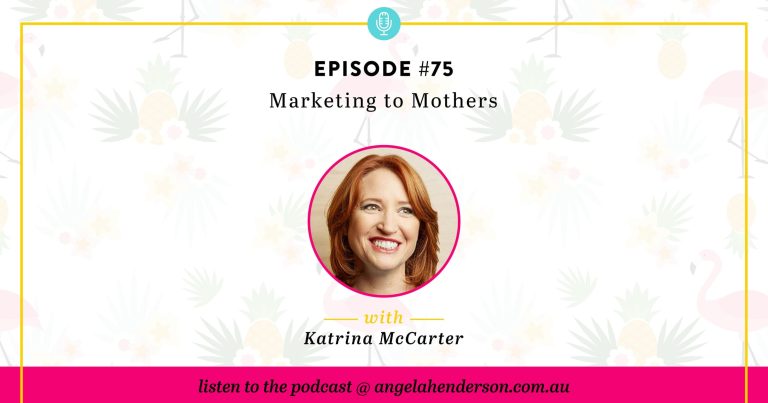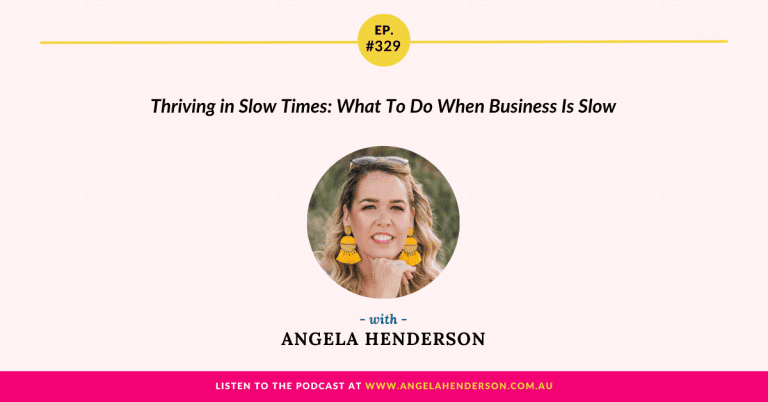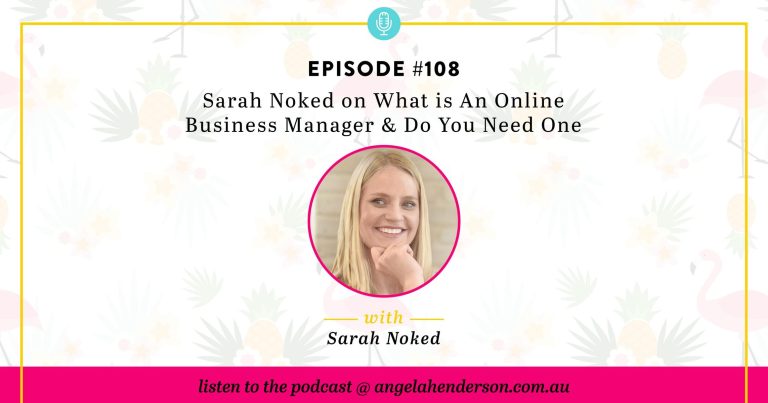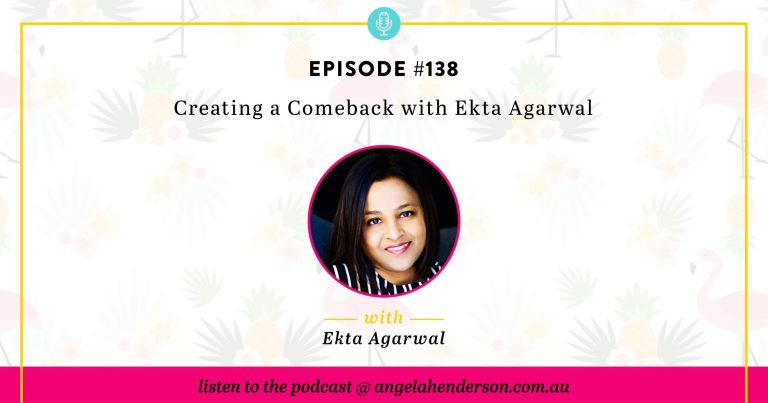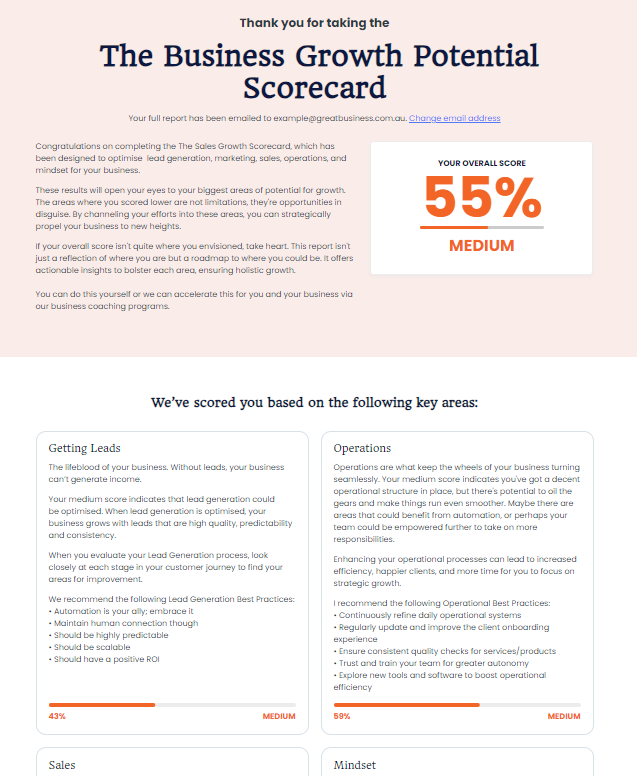In this episode, I am joined by Jessica Gwynne as we talk about hustling and un-hustling in business. We also touch on how Jessica helps women to be joyful, know their worth, and how they can earn it in their business by aligning their business and sales strategies. We then discuss how hustling can impact your business and health and the 5 myths associated with un-hustling and business.
Together with this, we share concrete examples of what we’ve experienced in our own businesses. And lastly, we give you 5 very important steps that you can take today to un-hustle in business and be more successful.
Links mentioned in the Show:
Prefer to read? Here’s the transcript:
ANGELA:
Hey there, you’re listening to the ‘Business and Life Conversations’ podcast. My name is Angela Henderson and on this show we talk about improving your business, life or both by having amazing and rich conversations with brilliant guests. Who will inspire you and who will give you tips and tricks to help you grow both in life and in business.
Hey there, Angela here, and welcome back to another episode of ‘Business and Life Conversations’ podcast. Today we’re going to be talking with Jessica Gwynne about why hustling is impacting your business and health, five myths associated with unhustling in business, and we’ll also share five very important steps you can take today to unhustle in business to be more successful.
Welcome to the show Jess, super excited to have you onboard today.
JESSICA:
Thank you so much, Angela. I’m super excited to be here. Thanks for inviting me on.
ANGELA:
Gosh, you’re very, very welcome. It’s so fun. Now, we first connected when you were running the most amazing business summit a few months ago and I simply loved your energy. When I started the podcast and started reaching out to some people, I was so delighted when you had applied to be a guest because you bring such a wealth of knowledge, but also such a vibrant energy that I think will be awesome for the listeners to hear and feel themselves throughout today’s podcast.
JESSICA:
That’s lovely. Thank you so much, Angela. I really appreciate that.
ANGELA:
Yeah, no worries. Now, before we get into your juicy topic today about, unhustling, I’d like to know, I’d like the guests to know on the show a little bit more about you from an individual level, because so often we get right into the nitty-gritties about business that we don’t actually get to connect with people from just a human-to-human level. I think it’s important that we do that. I guess my first question that I’d like to ask you today is to tell me a little bit of a story about something, a memory or a part of your childhood that still resonates with you today.
JESSICA:
Really, I love this question. I love that that’s the first question. It was easy for me to find one because when I was young, my grandfather had a dry cleaning run and so back in those days he had this Datsun Sunny 180 with no air conditioning, and wind the windows down, and water little spray things. We’d drive around and be on the run with him, it was our favourite thing to do.
What he’d do is he’d say, he’d call it “trivial pursuit,” or “playing trivial pursuit,” which really meant we had to be super vigilant about paying attention as to what was going on around us. Because at any moment he’ll be like, “What was on that sign back there?” You’re like, “Ah, what was it now?” And we want to win, and I’m so grateful for it because not only was it a game, it was heaps of fun and a great memory. And it has really given me the skill to pay attention, to see what’s happening around me and be observant. That’s my favourite childhood memory.
ANGELA:
That’s pretty awesome. And I think you’re right. So often we are so quick to either answer people’s questions or jump right in, that we forget to just observe and be in the moment and to take a step back and just listen, and I think it’s one of the skills a lot of entrepreneurs we don’t actually have, or we don’t flex our muscle as well because we’re so wanting to jump to the solution and help people. I do like that, that you’re able to just sit back and observe a little bit more. Now, obviously if he did the dry cleaning run, obviously I would also say that you’ve probably learned some valuable business lessons along the way too. Would you agree with that?
JESSICA:
Yeah, absolutely. He had his own business. Mum had her own hat shop and haberdashery back in the day, which don’t really exist anymore. Before Spotlight was a thing. And Dad had a sales business as well. So entrepreneurship through our family was big. And watching them was good in so many ways, but occasionally I picked up the odd belief that was not good that I had to get rid of over time, but being around that environment of “anything is possible” has just been invaluable to me.
ANGELA:
Tell me a little bit more, because I’m from Canada obviously, and I think you said that your mum’s business was a hat and a .. what was the other word you said?
JESSICA:
Haberdashery.
ANGELA:
What does that mean? Because again, I don’t know, is it an Australian thing?
JESSICA:
No, they don’t really exist anymore. It was like a treasure trove of zips and buttons, like Spotlight or Lincraft or those big material stores. Like one of those, but only the small stuff. So all of the little needles and cottons and .. just amazing stuff. As a kid it was so much excitement in that store because of all the possibilities of creation, which possibly is where my love for possibility came from.
ANGELA:
Oh gosh, I can only imagine you’d be like a kid in a candy shop at that age. Like the buttons, like my little one Chloe, man, the kid kills me. She’ll have the glitter and the glue and the buttons out at 4:30 in the morning and I’m like, “Oh my goodness.” Like again, I try and nurture it as much as I can, but sometimes I’m like, “Kid, it’s 4:30, let’s just put her down and let’s just let mama sleep, let mama sleep.”
JESSICA:
Never too early for glitter.
ANGELA:
Oh, dude, the kid kills me. It’s something like that. She would be in heaven, and I think too, growing up I also did a lot of cross-stitch with my aunt and things like that. And I don’t see kids these days doing it. I don’t know if that’s a sign that I’m getting old or, I’m not really sure, but I do think there’s value there because it allows you to almost sit in your boredom and concentrate on something, and I think that’s a whole other topic for another podcast. But anyway ..
JESSICA:
That was fun.
ANGELA:
All right, cool. So now we know a little bit about you, an amazing little memory that you shared about your grandfather and sitting in the back of the ute, as you guys call it here in Australia. Again, I still get a little bit thrown with those terms. So now from a business point of view, I really liked that, again, your key focus, correct me if I’m wrong, is being able to help women shift into a joyful kind of state, who knows her true worth. I loved to know more about what this means to you because obviously I’ve been following you for a little while, but I’d like you to be able to capitalise on that a little more today. Tell me a little bit more about your business and how that joyfulness comes into play with working with the women that you do.
JESSICA:
Over time, as usual, business has evolved and what I really started getting into in the last 12 to 18 months is the idea of helping women earn their worth. And the reason it became so apparent to me as I was doing some research on, it was Australian government reports, and women in business earned the least of anyone. And so not even women employed, it was like we’re doing it to ourselves. So I was like, “I need to sort that out.”
We need to realise just how amazing we are and the gifts that we have are worth money, value to people we’re taught at such a young age to give as females, and our value is in what we can give and do for others. But really our value is in our skills and expertise just like anyone else. Bringing that in and also bringing in, like you say, the joy that business doesn’t have to be hard. And that was one of the beliefs I did have to get rid of from my family. It didn’t always have to be a hard slog, that it could give the things that we enjoy, abundance and flow would come from that. And that’s really the premise of what I do. And my background is sales and marketing, using aligned business and marketing strategies to make all of that just sing.
ANGELA:
Gel together. Interesting that you bring up the topic about women and the worth around more what we get paid, or lack of getting paid I guess. And another business acquaintance that I know last night, and actually I was just finding it as you were talking, posted about female led startups actually raise less but they earned more. So it’s a study that’s just been released and it talks about female-founded startups raise less than half the venture capital funding of those funded by men, but generate more than twice the revenue, a major study has found. So interesting that people are less likely to back us, but yet we turn more than the man does. Now again, we could probably get into another podcast about men and women relationships, in regards to the business side of things.
But there’s also another lady, I believe she’s from Brisbane and her name is I believe, I’m just looking it up, Shanae? Is it Shanae?
JESSICA:
Who?
ANGELA:
Shanae Joyce I want to say it is. I could be wrong. Anyways, she’s on a big progression movement for women at the moment and saying, so often women are asked to speak for free, but at the same conference, men would be asked to .. they’d be given a speaker fee or they’d be given a travel allowance or whatever that is. And so she’s really on this progressional movement about women being able to ask for the same thing, or, you don’t have a plumber come to your house and say, “Oh, I’ll pay you in roast beef.” It doesn’t work like that. But there is this expectation or this belief that that’s what women should be doing. So again, it is very interesting.
Of the women that you work with, give me an example of where you’ve turned something into really something powerful and joyful for them, or not necessarily for you, but for them, I guess.
JESSICA:
One of the clients I’m working in at the moment, when we first started working together, she was coaching at the same time as nursing and she was a little bit scared to let go of the nursing, because taking the leap is scary. However, we really looked at what her value was, so what she really wanted to be making, and what did that really mean for her on a day-to-day basis. And with that in mind, we instantly doubled her prices. It’s a thing, and Angela and I were talking about this before.
ANGELA:
Yes, absolutely.
JESSICA:
But what her price is, and then within two days, that weekend she’d secured a two-day workshop at the new price. That meant that she was already on her way to earning that, the dollars that she wanted, basically, which was great. That’s the money side of things. However, over time now, so maybe three months in working together, what she’s been able to do too is step back in her business and see the stuff that she really enjoys doing and what she doesn’t and get rid of the stuff that she doesn’t like doing and focusing on the good stuff.
Now that she’s done that, all of these opportunities have come her way because she’s enjoying talking to people, getting out there, seeing the things, talking about what she’s really passionate about. People see that joy the like, “Oh, I want to talk to her. I want to know what she’s going up to.” And so all of a sudden, she’s got rid of her nursing registration, she’s earning what she wanted to earn, and she’s enjoying it as she goes. I just get passionate about it because it’s possible for everyone. I want that for everyone, because we don’t start a business to work 24 hours a day and be angry all the time or frustrated or whatever it is. We do it because we want to enjoy it and spend more time with our family or friends or travel or whatever it is.
ANGELA:
Absolutely. And I also think it’s so important you talked about there, about being able to outsource the bits that you don’t like. And I think it’s so important. Again, so many people don’t want to outsource because they’re like, “Oh, they’re giving over the reins.” But the reality of it is, is it opens up space for different levels of creativity for them, like you said, to go out to networking events, to build connections, whatever that looks like for that particular person. So yeah, I do agree with you 100% that getting rid of that stuff allows that joyfulness to come back into play.
JESSICA:
Yeah. And a lot of the time when I talk about it, this could be slightly off-topic, but it’s not a knocks, it is to do with unhustling. It is that it costs money. But yeah, but what’s your hourly rate, what do you want to be earning? And if it’s less than that, then what’s it actually costing you to do that thing? And also joy, like we said, it’s costing you your happiness.
ANGELA:
Absolutely. But again, and I do think it relates to the unhustling component. We can segue into that because if you’re hustling all the time at full capacity, especially doing tasks that you don’t like, it leads to burnout, it leads to physical problems potentially, it leads to marital problems potentially, it leads to mental health problems potentially. And I do think that it does, but often people think that they’ve got to source an Australian VA.
Now I’m all about contributing back to the Australian community 110%. However, there are times in business where I know for a fact that I still can’t outsource an $85 an hour job for 40 hours a week. So I’ve got two VAs that are Australian and I’ve got two VAs that live in the Philippines and they all have very different skill sets too, based on what I need them to do. And I’m happy to talk about, one of them is $4 an hour and another one is $9 dollars an hour, and some people get really narky, going “How can you take the money away from the Australian economy?” Be, I’m not valuing these women. But I’m like, “Well hold on a minute.”
My lady that’s making $4 an hour, the reality of it is she makes more than her husband makes. So she’s the ultimate breadwinner. She gets to stay home with their kids. There’s a level, her self-confidence has increased and I’ve referred other clients onto her because of the work that she does. So I look at it as a bigger picture and I look at it at the end of the day, she’s just a woman standing there trying to be a mum, just like anyone is in any country, whether or not you’re first, second or third world. So I do think that again, getting rid of some of those tasks is fine and it’s okay to employ someone from a different country too. But a lot of women don’t give themselves permission to look elsewhere, they’re just thinking Australia.
So now hustling. This is an important rant I’ve been going on about for the last, since I’ve probably been an entrepreneur for eight years, because I’m a mental health clinician by trade. And I see different copings, different levels of mental illness at various stages in life, from young all the way through to old. And as much as I love Gary Vee for example, and I say this in a lot of podcasts that I’m on, is that there’s an element that he .. He talks about working hard too. And I agree. You do need to work hard in order to be successful. I have no qualms about that. But to say you have to hustle all the time in order to get success is where I’m not necessarily, well not necessarily, it just doesn’t resonate with me whatsoever. So I was super excited when we were going back and forth about the topics that you’d be talking about today, and how actually by unhustling in business you can have the opportunity to be more successful. So I wanted to chat with you today about why unhustling in business is so important to you.
JESSICA:
I feel like that we’re really taught from an early age that we have to do all the time, that we’re good when we’re doing the right thing, and that’s the only way to get ahead. However, what I’ve learned more recently too, for years I was hustling and I was tired and I drank a lot of coffee and my eyes were terrible. But I’ve learned that as I’ve stepped back in my business and allowed things to happen around me, and sort of do this almost a natural weight.
Angela, I was talking just before we came online that at the moment I’m launching a new product, and it’s been in the back of my mind for a while, but I knew that it wasn’t the right time. So if I pushed that and I was doing it all the time, I’d get really frustrated. But because I waited and I waited for people to say, “Yeah, actually do you have this thing?” It’s like, “Well, funny you should ask that.”
ANGELA:
I do, thank you.
JESSICA:
And it’s allowed it to flow, and it’s been really easy, and I don’t think unhustling is doing nothing. It is doing what feels right to move your business ahead. And so I tend to, sort of getting bit into it, but looking at your 90-day, 60-day, 30-day goals and looking at what you need to do this week to move forward to it. But not having to do all the things all the time, and always scattering your energy. And as you say, mental health, doing that all the time doesn’t allow you time to be you. To have your relationships, have fun, eat well. All of the things that make us a healthy, happy human being.
ANGELA:
And I think you’ve talked about, again, you can have your 30-day, 60-day, 90-day plans, and it’s one of the things that I work on with my own one-to-one clients, is that they feel that they should have this list of 50 things that they need to do for me at the end of each session. And the max that we ever have is 20 things. I literally break them down, task one. And what I say to them is if you take your weekends off and actually give yourself permission just to be with your family, connect with friends, etcetera. That even if you only did one task per day for those other 20 days, your business would still gain momentum.
Now it might not just skyrocket, but it gains a momentum and traction that you’re then not ever feeling that you have to hustle, hustle, or you’re not doing sweet FA. Right? So just in that middle bit. And they’re like, “Oh.” And it takes them a couple of months to get used to the fact that I’m not giving them more, I’m actually giving them less, but yet they’re seeing more goals and return on investment come from that.
So now, do you think when people hustle all the time or, well again, we’ve talked about it briefly, but what do you feel hustle is doing to our health and then our overall business?
JESSICA:
I feel like hustle in particular has a belief that sits behind it, and it’s given to us a lot, particularly as women in business, by men in business. Because like Gary Vee, like you said, totally agree with that in that he’s got amazing ideas, but this idea of hustle doesn’t resonate with me. And what I feel like it does is it, and what I’ve seen in my clients, is that it makes us stuck because it gives us this belief that we’re not doing enough, but we also don’t have clarity about what we need to do. And so clarity leads to confusion and then we’re stuck, and then we’re busy doing all the things that actually aren’t moving us anywhere, we’re just going around in circles.
And when we do that, because we’re not moving anywhere forward, we get a little bit down on ourselves, get depressed about what it is that.
ANGELA:
Absolutely.
JESSICA:
Comparing ourselves to other people, which is the thief of joy as we know. All of that spirals down into, well, I’m not moving my body like I should. I’m not eating perhaps as well as I should, I may be drinking too many coffees or having too many wines at night. All of those things come down to mental health, then reflecting in our physical health.
ANGELA:
Absolutely. I think it’s a combination, isn’t it, that it’s kind of like the apple and cart, or horse and cart analogy now, that it definitely, it’s a knock-on effect. Even to the point, there’s an app now that I have on my phone, I can’t remember the name of it off the top of my head, where it prompts me to get up and move every 30 minutes or every 20 minutes. I think it’s just kind of like an alarm and it’ll just say “shake it and move it,” or something like that.
But it’s just a reminder because so often before I had that app, I would just sit here at my computer, and the next two or three hours would come and then you’re so hungry, and then you just start eating like salty chips or donuts. And I do do that. That’s why my third butt is growing. I’m too consciously aware that, sometimes we’re just so engulfed in what we need to do that we sit back and that, again, the hustle is being a detriment instead of a productivity measure.
JESSICA:
Exactly.
ANGELA:
So now tell me, what do you think are the top five myths associated with unhustling in business?
JESSICA:
The easiest and the biggest one is if you’re not doing all the time, you’re lazy. You’re lazy or you’ll never get ahead. And that’s what we .. I had to deal with that so much personally. The other one is like, “Everyone else is always hustling, everyone else is doing it, so I’d better do it. I don’t want to be left behind,” which is just not true. When you look at some of the most successful people in your industry, I guarantee you they’re not hustling all the time. The other one is like, “I’ve got so much to do I can’t unhustle.” A lot of that comes back from no clarity, no clarity in where it is that we’re going. “So if I do all the things, maybe I’ll eventually get there.” “My business will crash and burn if I don’t hustle.” I’ll give you the tip. It doesn’t.
I went way unhustling, I went way the other end towards the end of last year. I was like, “I just need to step back from all this,” just thinking I’m crazy. And good news, I’m still here.
ANGELA:
You’re still kicking.
JESSICA:
Still kicking, still going. And the other one too, the fifth one is that “people will forget me. People will forget me if I’m not posting all the time, I’m not on Instagram all the time, I’m not blogging all the time,” whatever it is. It’s a fear of “I need to get out there, otherwise people won’t remember who I am,” and it relates back to those others, “My business will crash. Everything will crash and burn if I just stop for a day.” And it’s just not true.
ANGELA:
Absolutely. And I really love the one where you talk about, don’t get me wrong, but we’re always, not always, but let’s be honest, we’re all on Facebook or social media platforms at some stage during the day, and I think again, social media puts such a facade, don’t they? It makes it look like everyone’s so busy. There’s not a lot of rawness really.
I remember dear friends of mine, Emma and Carla, the Merrymakers down on the Gold Coast, beautiful souls that I just love to bits. And I remember we came back from Tropical Think Tank with Chris Ducker and I had my list of things, and I’m sitting there and I’m like, “Oh my gosh, I’m hardly getting,” but on their feed they were like doing this and doing that, and I remember having conversations with the girls and they’re like, “Ange. We both aren’t dating anyone. There’s two of us in the business. We don’t have any kids.”
That to me a few years is my biggest realisation that my scenario is so different to everyone else’s and that you can’t compare. So it was a big eye-opener for me because they are right, there’s two of them. So they’re like, “Ange, we’re working on the business. Even if we just worked four hours each day, that’s still eight hours that we’re able to produce work.” And the other thing that I think is interesting too is you talked about if we’re not seen all the time, but again, I would much rather produce quality content, or quality posts or whatever, than quantity. Because I think you could actually damage your reputation if you’re just posting up random stuff. What are your thoughts about that?
JESSICA:
Literally agree, and particularly with all the latest changes with the algorithms that there is no benefit now to this posting every day, or posting crap, basically, every day just to be seen. In fact, it’s detrimental on Facebook, on Instagram now with their new one as well. So making sure that what you’re posting is beneficial, genuinely beneficial to your audience, then you will get the traction that you want and need.
ANGELA:
And, you’re not having to hustle as much either. Because if you just have to do one post versus .. When I did my first business, Finlee and Me, which we still have, I did some split testing where I would post four times a day on Instagram, on Finlee and Me, and four times a day on Facebook. Well, I didn’t, my VA did. And we noticed that the four posts on Instagram, let’s just say I had 500 likes in the day through those posts. They would each get about 125 likes per post. But if I posted one post a day, I would still get the same amount of likes as I did by having four. So it was again another eye-opener for me. You’ve always got to split test, but again, in this instance you don’t have to hustle if you only need to do one.
JESSICA:
No.
ANGELA:
Perfect. So now tell me .. all right, so we’ve talked a little bit about what hustle is. How you and I both aren’t very big fans about the whole hustle world. But tell me, what are your five things a business owner can do today in order to really unhustle so that they can make room to be more successful?
JESSICA:
I think the biggest one is recognising a lot of the time that hustle, or being busy all the time, is actually about a fear. There’s a fear lying behind it of “not enough, not posting enough, not being good enough, not having enough value,” whatever it is, not being seen enough, that that is the fear that sits behind it. So it’s like, “I’ll do the things and then it’ll be fine.” The recognition of that takes away about 90% of it straightaway.
Recognising that what you are doing is enough, and like you say, not comparing yourself to anyone else’s Instagram. For example, because how good are Instagram lives? What you’re doing is enough and recognising that, you can cut away about 80% of the rubbish that’s going on straightaway. Then identify the key drivers in your business. Know your numbers. How many people do you need to speak to, to get the amount of sales that you want to make the money that you want, and how much can you spend to speak to that many people?
When you know that, you can cut away all the other rubbish that’s happening in your business and focus on what’s going to drive your business forward. When you do that, you cut it again. You cut away another like 20% of stuff, rubbish that’s going on around the outside. Then, learning to prioritise. So I touched on it really briefly before, what’s going to move you forward in the next 90 days? What’s your five key things that you want to do? What’s that look like this month? What does that look like this week? What does that look like today?
Every day, I’d show you, but it’s pointless because it’s a podcast, but I have these Post-It notes that have lines on them, and I fill one of those a day and that’s it. I can only do what’s on this Post-It note every day. If I choose to do more at the end of the day, then that’s okay, but these are the things that need to get done to move my business forward. And when I’ve done that, it’s like, “Yeah, cool. All right, it’s 2:00. Great. I’m going to go for a walk.” It’s okay to move away from the computer in the middle of the afternoon.
ANGELA:
Give yourself, again, that permission, because people think, “Well, if I go out for a walk, then it means my business ..” Again, that myth that, “it’s going to crash and burn and that I’m never going to get anywhere.”
JESSICA:
Exactly. And side note, I’ve been forcing myself for two weeks, two weeks now, to 20 minutes a day, go for a walk. With no technology, so I’m not allowed to be on the phone, not allowed to be looking at anything, not listening to anything, just in nature. And the momentum that’s created in the last two weeks in my business is insane. So that’s just a side note.
ANGELA:
A positive side note though, I do love it.
JESSICA:
The next one that we touched on before, outsource. So what’s the stuff in your business that you hate doing? Get rid of it. Don’t be doing it anymore. And as Ange said, start at $4 an hour. It is a little bit of a topic that maybe gets a few people’s backs up, but similar to your story, when I had my social media marketing company, I couldn’t afford in the beginning to bring someone on in Australia. So I brought someone on in the Philippines. And in the business end, which meant I could continue working on growing the business, and then I hired someone in Australia part-time, and so it created a job because I was able to outsource offshore in the beginning. So as you say, permission, give yourself permission to do what’s right for you, not what other people say is right for you.
And then the other thing, take a day off. Just take a day off and see what happens, because the spoiler alert is that the world doesn’t end. Give it a go. Just turn on your auto-responders and say, “I’m out for the day.” Because if you go to a conference, you’re out for the day. The world doesn’t end. But you’re like, “I feel good about this because I’m doing something.” Well, do something like going to the beach for the day or taking the kids somewhere or doing something fun, and give yourself the time and the space to have joy, and that joy will just flow back into your business.
ANGELA:
I think there’s something to be said about that too and the day off. I remember when I used to work in my mental health position, another friend and I, we code it the “green dot day.” And what we would do is we would actually strategically plan these days off for our own mental health. But what that gave us is we were no longer whinging at work going, “Oh, another day, oh, another day,” because we saw the light at the end of the tunnel. So by planning, I also think too, it helps you to go, “Okay, I’m going to need to get this and this done, and then I’ve got the whole day.” I don’t have to think about, say for example, social media posts or I don’t have to think about this and you can just be in that true moment. Similar when I’m heading to Bali in just a couple of weeks’ time and when I first started my .. Eight years ago we would go and I would be on the computer so often and then I was like, “Hold on a minute, why am I even in Bali then? I might as well just be back in Brisbane working.”
And so listen, your business still needs to run along, don’t get me wrong. And I think business owners that take a year off and do nothing, you would come back to a mess. So what I’ve put in place is after we have breakfast in the morning in Bali, the husband will take the kids, he sunscreens them, gets their swimmers on, etcetera, and I quickly do a 30-minute to 45-minute check in with all the immediate things. And then from there, at nighttime they’re normally in bed around 7:30 because they’ve been swimming or whatever all day, they’re exhausted. And then I’ll sneak out, because the hubby goes to bed early too. They’ll sneak out and then I’ll hop on for another hour. So again, but I can get so much done in those like hour and 45 minutes because you know that’s all you’ve got. So I actually think you can be more productive with less time than with more time.
JESSICA:
It’s that principal, whatever, I always forget the name, but like give yourself two hours to something, you do it, give yourself 10 minutes and you do it too. I travelled in America for six weeks and I do a couple of hours in the morning. Then I’d go out in the middle of the day and enjoy a couple of hours in the afternoon, and then go out for the night. It’s amazing how much work you can get done when you just give yourself that amount of time.
ANGELA:
Absolutely. And that’s what a lot of people too used to say me when I was working full-time and running the businesses, going, “But how do you do it?” And like I said, I would only work at night on the business and so that’s all I had. You didn’t have the luxury of skimming Facebook, social media was shut down and you just had to get the tasks done. There’s something to be said with working less but making more.
JESSICA:
And if you do it with that prioritising, knowing exactly where it is that you need to go and what you need to do to get there, then it becomes super easy to do.
ANGELA:
I totally agree with you 100%. All right, so you’ve given us some cool tips about that. Now to wrap up, tell me what’s the mantra you’re living by at the moment for you?
JESSICA:
At this very moment it’s play a bigger game. For so long I’ve been playing small and I’ve had the realisation a couple of times, but I needed this last one to remind me. And I’m seeing it a lot around the women in business around me as well, is that there’s almost this awakening happening at the moment of, “Oh I can do this. Oh I can be bigger. I can speak on stage, I can write a book, I can grow my business.” And it’s a game, so let’s all play a bigger game. And that’s what I’m living by at the moment.
ANGELA:
Dude, I love it. Play a bigger game because again, so often we play, I think safe. I don’t know if you had seen in my Facebook group, the Australian Business Collaborative, I talked yesterday about trusting in the process, and also where you’re meant to be. You might not like where you are, but you’re where you’re needed to be. And yesterday was one of those things where I was like, “Man, I signed a contract on ..” I interviewed about 15 different Facebook specialists and I was like, “Oh my goodness, this is painful. The costs are insane.” And I too am like, “Man, I have to play a bigger game.” I can keep being safe, but will I ever grow the way that I want to grow? Probably not. So I do love the “play the bigger game.”
Now listen, like I said, you have a wealth of knowledge. So the listeners would like to know more about where they can find you. Where would you like them to find you? Let us know.
JESSICA:
I am Jessica Gwynne dot com, which is a bit hard to spell. G-W-Y-double-N-E dot com. On there you’ll see I do have a Facebook group called “Be a Lady Boss,” so that’s how you can jump in and join for free and get marketing tips. It’s the month of giving this month, so freebies every day, which is exciting.
ANGELA:
Dude, yes. I love a good freebie. And is there anything else that you’d like to tell us from an unhustling point of view? Any final words before we wrap up the session today?
JESSICA:
I think it’s just give it a go. No matter how scary it feels, just try, like we said, taking a day off, because the little steps, or even if it’s just an afternoon, the little baby step will show you that it’s okay. You can do it and then you can do the next one. You won’t know yourself with the ease that you create in your business by stopping doing all the time.
ANGELA:
Yes. Well listen, it has been fabulous having you onboard today Jess, and again, those who are wanting to know more about Jess, make sure you head to her Facebook group. Thanks so much for being on the show, I really appreciate it.
JESSICA:
Pleasure. It’s been fun. Thank you.
ANGELA:
No, you’re very welcome. And for the rest of those have an awesome day everyone, and I look forward to sharing with you an amazing story from a wonderful lady next week that will leave you all with a little bit of inspiration. This is Ange from Angela Henderson consulting. Have an awesome day everyone.
ANGELA:
Thanks for listening to the ‘Business and Life Conversations’ podcast with Angela Henderson, www.angelahenderson.com.au
